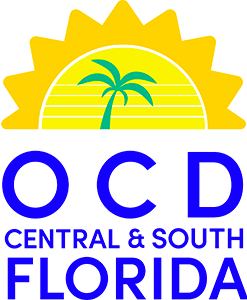Obsessive compulsive disorder (OCD)
OCD is characterized by the presence of obsessions and/or compulsions. Obsessions can include recurrent unwanted thoughts or images that typically cause distress, which the person attempts to reduce by some sort of compulsion. Common obsessions in OCD may include concern for germs, contamination or illness fears, excessive doubt, and excessive concern for morality, symmetry, order and perfectionism. Compulsions are repetitive behaviors (e.g., washing, or checking) or other mental acts (e.g., counting, mentally reviewing events) that the person attempts to do in order to reduce anxiety associated with bothersome thoughts. Common compulsions involve ordering, checking, or repeating things until it feels “just right.” To meet diagnostic criteria for OCD, obsessions and compulsions must be time consuming or cause the person significant distress or impairment in an important area of functioning, such as school, work, or family life. Some individuals with OCD have very good insight, in that they recognize the symptoms as being OCD, but have difficulty resisting related compulsions. Other individuals may have very poor insight into the nature of their symptoms, and in such cases, it is often family members who are urging them to seek treatment.
Tourette’s Disorder
Tourette’s Disorder is characterized by multiple motor and one or more vocal tics. Tics may wax and wane in frequency and complexity. Simple motor tics are of short duration and may include blinking or extending extremities, whereas simple vocal tics may include throat clearing or grunting. More complex motor or vocal tics may include turning the head and shrugging, or repeating words. Tics are fairly common in childhood and often decrease over time. However, some individuals may experience tics into adulthood, ranging in severity from mild to very impairing. Additionally, tics can be worsened by anxiety, stress, or fatigue.
Hoarding
Individuals who struggle with Hoarding have persistent difficulty getting rid of items, regardless of their actual value, and become very upset when they must get rid of items. The person may sometimes spend a great deal of time ordering or arranging their items. Some individuals with this illness spend a significant amount of timing acquiring items , even those which have little to no value or purpose, such as pamphlets, or magazines. This often results in the person accumulating possessions that congest or clutter one’s living or work space. Sometimes this can impair the person’s ability to use important areas of the home, such as the kitchen or bath. The hoarding behavior often causes significant distress and impairment in important areas of functioning.
Trichotillomania
Trichotillomania involves the recurrent pulling of one’s hair, from any region of the body, which causes hair loss. The most common sites for pulling include the scalp, eyebrows, beard and eyelids, although other sites can be pulled as well. Often, the person repeatedly tries to stop the behavior, but is unsuccessful. Many individuals with this illness began pulling their hair during childhood or adolescence; however, the disorder can begin at any age. The hair pulling often causes significant distress, such as feelings of embarrassment, or impairment in an important area of functioning. Often, individuals with trichotillomania will exhibit symptoms of another body-focused repetitive behavior, such as skin picking or nail biting.
Body Dysmorphic Disorder
Body Dysmorphic Disorder (BDD) involves excessive preoccupation with one or more perceived defects or flaws in physical appearance. These perceived flaws are not observable to other people or are very minor, relative to how much the person believes them to be a problem. Typically, during the course of BDD, the person will engage in repetitive behaviors or mental acts when experiencing these concerns for their appearance. Such behaviors might include repeatedly checking the mirror, excessive grooming, seeking reassurance about one’s appearance repeatedly, or constantly comparing one’s appearance to others. The preoccupation with perceived physical flaws causes the person significant distress, and it interferes significantly with social, work, or other important areas of functioning. For instance, a person who believes his hair is thinning may be preoccupied with studying his appearance in the mirror, or comparing his present appearance to old photos and feel unable to go out in public without a hat.
Skin Picking/Excoriation Disorder
Skin Picking/Excoriation Disorder involves recurrent picking of the skin, which can result in scaring, or lesions. The person has often attempted to decrease or stop skin picking, unsuccessfully. The picking is often perceived as distressing and may cause significant impairment in social, occupational, or other important areas of functioning.
For more information on OCD and related disorders as well as their causes, prevalence, and treatment, visit the IOCDF website: www.iocdf.org/about-ocd
